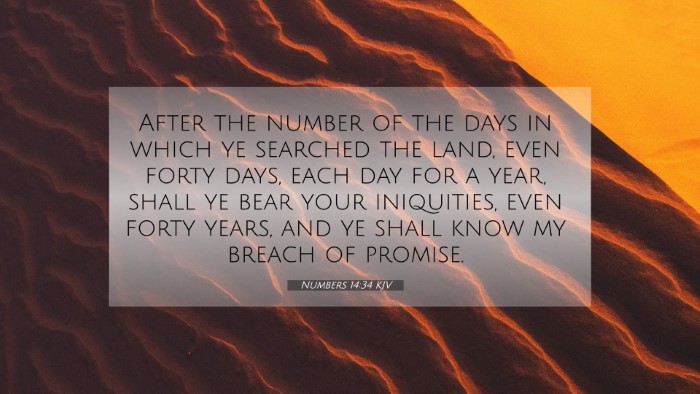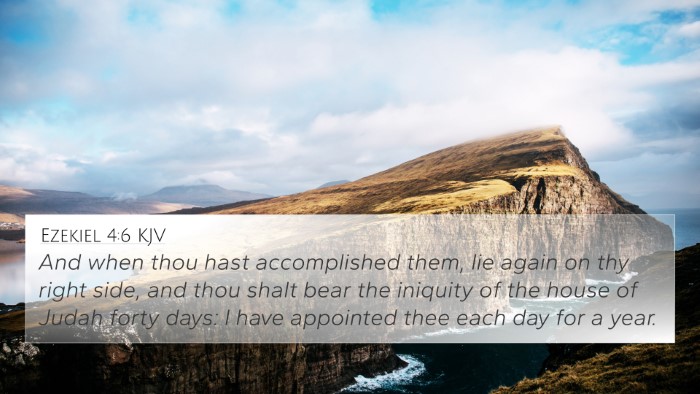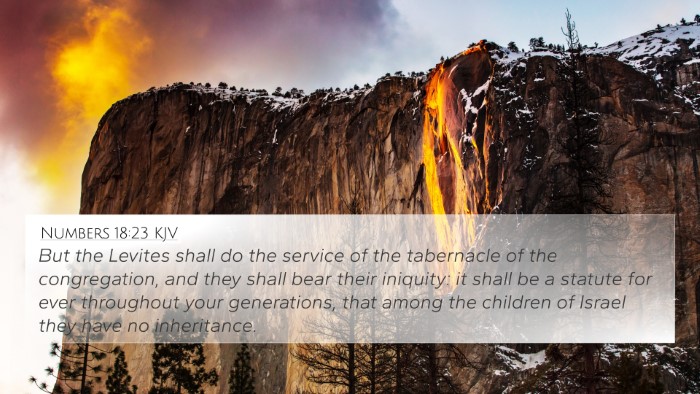Understanding Numbers 14:34
Numbers 14:34 states, "After the number of the days in which you spied out the land,
even forty days, each day for a year, shall you bear your iniquities, even forty years,
and you shall know my breach of promise." This verse is located in the context of
Israel's lack of faith and rebellion against God's command, leading to significant consequences.
Summary of Meaning
This verse emphasizes the concept of divine punishment as a direct response to the
nation of Israel's lack of faith in God's promises.
It establishes a lasting principle that their forty days of exploration are
transformed into forty years of wandering, symbolizing a tragic period of
correction and lost opportunity.
Verse Context
In order to fully comprehend the implications of Numbers 14:34, it is essential
to examine its context within the adventure of the Israelites. After being freed from
Egyptian bondage, they are on their way to the Promised Land. However, upon surveying
the land, the ten spies (out of twelve) brought back a negative report that incited fear
and disobedience among the people. The CD consequences laid out by God are made explicit
in this verse.
Commentary Insights
- Matthew Henry: He suggests that the period given to the Israelites
reflected not only punishment but also God's effort to teach them about the seriousness
of trusting Him. Their wandering in the wilderness serves as a reminder of the
repercussions of disbelief.
- Albert Barnes: Barnes underscores the number symbolicism in the
forty years, correlating it to a generation lost due to their disobedience. It highlights
God's promise to fulfill His promise, even in the face of Israel's rebellion.
- Adam Clarke: Clarke gives attention to the fulfillment of God’s covenant,
indicating that God would ensure that none from this disbelieving generation would enter
the Promised Land except for Joshua and Caleb, demonstrating God's justice alongside
His faithfulness.
Related Bible Cross-References
- Exodus 23:25: A reminder of God's promise to protect and bless those who
serve Him.
- Deuteronomy 1:34-35: God's response to the Israelites' complaints and
lack of faith emphasizes His judgment on that generation.
- Hebrews 3:17: The New Testament reference highlights that those who
provoked God were denied entry to His rest.
- Joshua 14:6-12: Caleb referring to his faithfulness and the promise of
land due to his belief in God's word.
- Psalm 95:10-11: A reflection on the disobedience of Israel and
God’s feelings about their actions.
- Ezekiel 20:15-16: God’s declaration about how He swore to keep Israel
from entering the land due to their rebelling heart.
- 1 Corinthians 10:5: An admonition that God was not pleased with most
of those who left Egypt, engaging in a warning for future generations.
Thematic Connections
The themes illustrated in Numbers 14:34 communicate broader Biblical principles.
Not only does God take disobedience seriously, but he also emphasizes faith.
This theme resonates throughout the Bible, as seen in both the Old and New Testaments.
Exploring the Cross-References
Exploring the connections between the scriptures, particularly looking at
cross-referenced themes in the Bible, can deepen one's understanding of spiritual
insights and God's relationship with His people. The Old Testament consistently reveals
God's character while the New Testament provides the fulfillment of God's promises.
Why Cross-Referencing Matters
Cross-referencing Biblical texts is crucial for comprehending scripture.
By linking Bible scriptures, one can uncover enriched meanings and insights.
Tools for Bible cross-referencing, such as concordances and study guides,
enable readers to explore scripture themes efficiently.
Conclusion
Numbers 14:34 serves as profound instruction highlighting God’s response to
disobedience but also His unwavering promise. Engaging in a comprehensive Bible cross-reference system allows individuals to delve deeper
into God’s word, understanding its richness and breadth through cross-referenced themes.





















